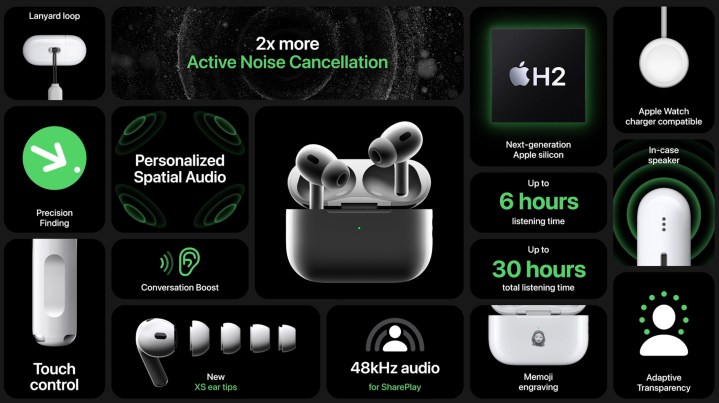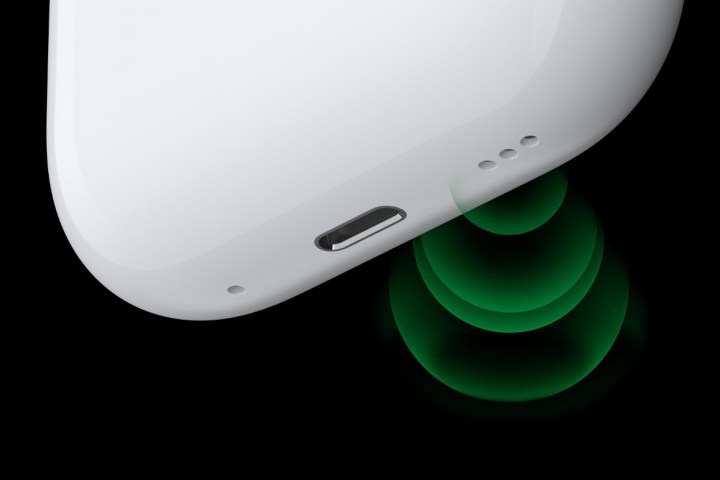The latest AirPods Pro (now in their second generation) are the new top-shelf addition to Apple’s expansive lineup of wireless earbuds. Featuring across-the-board sound and noise-cancellation improvements (according to Apple, anyway), user-specific “personalized” Spatial Audio profiles, and a new touch control for adjusting volume — plus a few other surprises — there’s plenty to love about the new set of buds.
But all that begs the following question: Should you upgrade to the new AirPods Pro?
That’s a fair question to ask, and considering the fact that we haven’t received a new set of AirPods Pro since the originals in 2019, we understand why you may be wondering if it’s time to part ways with your original set. To help you get to the bottom of this imposing “should I?” conundrum, we’ve gone ahead and unpacked some of the latest AirPods Pro features to help you compare and contrast apples to … apples?
H2 means bigger, better, and more personalized sound

One of the biggest signs of a major hardware improvement is the arrival of a new core processor. Apple is moving from the H1 chip (found on the original AirPods Pro) to the all-new H2 in the new AirPods Pro. And if you care a lot about sound quality and adaptive audio features, the H2 inclusion alone may be worth the upgrade.
But what exactly does the H2 chip bring to the table? For starters, it has allowed Apple to completely rework the drivers and amplifiers for the AirPods Pro. This means the new AirPods Pro deliver a bigger and better soundstage, with greater depth and articulation across high-, mid-, and low-end frequencies, Apple says.
If you’re an everyday music listener, or even a podcast enthusiast, chances are you’re going to notice a decent bump in sound quality between the original AirPods Pro and the second-gen model.
Will it be night and day between the first- and second-generation AirPods Pro? While that remains to be heard (we’ll be reviewing them thoroughly soon), the H2 upgrade affects more than just overall sound quality. The new chip also brings advances in noise-cancellation technology, with Apple claiming that the new AirPods Pro will deliver double the amount of active noise-cancellation (ANC), as well as an improved Transparency mode that automatically adapts to the environmental ambience, filtering out unwanted noise while enhancing the sounds we need to hear (like people trying to have a conversation with us).
The H2 will also use the iPhone’s TrueDepth camera (and iOS 16) to analyze our head shape and ear canals, giving us Personalized Spatial Audio for some of the most immersive head-tracking, 3D soundstaging the world has ever seen in a set of earbuds — that’s what we’re expecting, at least.
And while the original AirPods Pros are not slackers when it comes to performance, the next-gen Pros are slated to outperform the OG buds in every audible way.
Longer battery life, same price

The introduction of the H2 chip goes beyond improvements to the listening experience, with the new AirPods Pro slated to deliver a better overall battery experience, too — from the buds themselves to the charging case.
Compared to the 4.5 hours of listening time of the original AirPods Pro and 24 additional hours through the MagSafe case, Apple claims the second-gen AirPods Pro will provide up to 6 hours of AirPods life and up to 30 additional MagSafe hours. If you’re always recharging your AirPods Pros on the go, that extra six hours of charging case power is going to be a pretty big deal. From a battery perspective, the AirPods Pro 2s are the obvious choice.
And in terms of cost, it’s only recently that Apple dropped the price of its original AirPods Pro as part of an effort to sell off the remaining first-gen stock before completely switching over to the new AirPods Pro. The best part though? The AirPods Pro 2s are priced at $250, the steadfast cost of the original model.
Extra peace of mind for the MagSafe case

Are you a frequent wilderness trekker? Or maybe a regular visitor to the gym? Even an everyday subway commuter fits into this rhetorical pondering. Whatever your reasons for constantly being on the move, the original AirPods Pro can be added to Apple’s very handy Find My network. This means that if one or both of the AirPods go missing, you’ll be able to use the Find My app to track them down.
But in terms of the first-gen Pros, the Find My feature only applies to the AirPods themselves, not the charging case. For the second-gen AirPods Pro, both the buds and the case can be added to the Find My network, thanks to the inclusion of the U1 chip and an integrated speaker on the MagSafe case, which now emits a chime when you activate the Find My beacon.
The earbuds themselves don’t even need to be in the case to start tracking them down and Apple even thought to include a side-facing lanyard hookup (lanyard sold separately), making it quick and easy to clip the MagSafe case to a backpack, laptop case, or other carry-on, helping to ensure you don’t lose it.
Oh, and let’s not forget that the new MagSafe case is also IPX4-rated, which is weatherproofing protection you won’t find on the original AirPods Pro case.
If you’re the forgetful type and prone to misplacing your AirPods, the new-and-improved AirPods Pro 2 are a step in the right direction.
Parting thoughts
Unlike iPhones, iPads, and MacBooks, the Apple AirPods family doesn’t see new versions anually. It’s been three years since the original AirPods Pro debuted in 2019, which means it could be a while before Apple gives us another Pro revitalization. And frankly, with the slew of upgrades that the second-gen Pros are receiving, right now it’s hard to imagine what a third generation could offer another two or three years down the line.
Are we saying that you should get a pair of AirPods Pro 2 because they’re the latest and greatest version of Apple’s flagship earbuds? Kind of. Until we test them out for ourselves, we can’t say that definitively, but at the same $250 price tag, the basic upgrades to the buds — more powerful H2 chip, plus improved sound quality, noise-cancellation, and battery life — alone may be a good enough reason to grab the second-gens.
But some may argue that these upgrades are pretty par for the course when it comes to any next-gen set of earbuds, and unless you’re specific interests lie with some of the more interesting upgrades such as the new Find My features, MagSafe case and U1 chip, personalized Spatial Audio, and the stem-based volume controls, then maybe taking advantage of the discounted first-gen AirPods Pros might be the way to go.
Editors’ Recommendations




